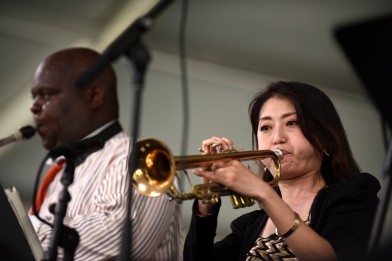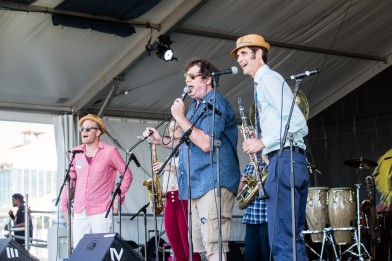Every now and again you hear a grumpy jazz-head complain about the Jazz Fest not really being about jazz anymore; and with main headliners including The Red Hot Chili Peppers, Snoop Dogg, J. Cole and Flo Rida, there’s a case to be made there. Yet on its big opening day, the festival has proven again that it is still a prime event for jazz listeners.
Aside from all the quality traditional New Orleans jazz bands that preserve the art as it was originally played, the line-up embodied what jazz means today, an ever-expanding, all-inclusive idiom that takes many forms and inserts itself in countless other genres.
Jazz is a connector, that’s why we saw great jazz pianist David Torkanovsky under the blues tent, playing outstanding solos on rhythm and blues tunes on Shannon Powell’s Tribute to Smokey Johnson.
Connections are made across genres and also across lands and cultures, as we’ve seen with jazz drummer Jason Marsalis and pianist Jesse McBride backing up Japanese trumpeter Aya Takazawa on hip modern arrangements of classic jazz tunes like the St. Louis Blues.
Marsalis reinforced the idea of jazz as a connector with his own band, contesting the struggles between traditionalism and modernism in the music, with his “21st century trad band” concept, or with a trad standard arranged à la Thelonious Monk, “Didn’t Monk Ramble.”
Everyone is excited about the coming of Stevie Wonder, and New Orleans pianist, composer and arranger Matt Lemmler saw an opportunity there to bring back his 10-piece band that recorded Portraits of Wonder in 2001. With vocals from Leah Chase and featuring world-renowned New Orleans drummer Brian Blade, Lemmler’s band showed how Stevie’s big radio hits can also be subject to intricate jazz interpretation.
The Panorama Jazz Band’s set on the Jazz & Heritage Stage was a fine demonstration of the way traditions from various places can be married together and unite people around a fun, dancing time.
“Lena Horne used to call me Mr. Cool Breeze.” Donald Harrison Jr. brought his premium showmanship to the Congo Square Stage. Standing in front of the stage in a bright white suit, Harrison played through 1980’s dance hall hits, with soulful vocals from guitarist Detroit Brooks, percussion from Bill Summers and the three members of New Orleans jazz project The Bridge Trio, keyboardist Conun Pappas, bassist Max Moran and drummer Joe Dyson.
Having gathered the crowd’s full attention and excitement (and pulling the old “introduce the members of the band” trick), Harrison took the opportunity to turn the spotlight on the youth. He thanked Dyson who will be moving on to pursue his own projects before introducing his young replacement behind the drum set. To show off the new cat’s ability to hang with the veterans of the scene, Harrison chose to put him to the test with a challenging modern jazz composition, changing the tone of the show for the sake of acknowledging the young man’s hopeful future. This time, jazz served as a connector across generations.
Dyson was to be seen again soon, back under the jazz tent, playing a drum set made of West-African traditional percussion for a set with Harrison’s nephew Christian Scott aTunde Adjuah.
Scott’s stretch music is all about connection: bringing in Hip-hop ideas, Chinese harmonies, African rhythms in a whirlwind of energy played through a jazz instrumentation. The show suffered from a series of stage sound issues, but the group bounced back and by the end of the groovy “West of the West,” the crowd was conquered again.
From Doreen’s Jazz New Orleans pulling from the roots of this music, to Scott’s sight set on tomorrow’s sounds, Jazz Fest opened with treats for all the open jazz ears. And with names like Jack DeJohnette, Wayne Shorter, Herbie Hancock, Joe Lovano, Gary Bartz and many others coming to those stages, we’re only getting started.
(Sidenote: As expected, Sharon Jones & the Dapkings blew the roof off of the Blues Stage.)






